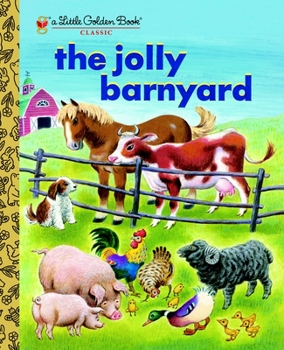Book Overview
In this classic Little Golden Book from the illustrator of Tootle, The Little Red Caboose, and Scuffy the Tugboat, it's Farmer Brown's birthday, and the animals are deciding what they'll do for him on his special day. "Cluck I will give him eggs," said the hen. Said the rooster, "I'll wake him in the mornings, then." "Baa-aa, we'll give him wool," said the sheep. "For our fleece is soft and warm and deep."
Format:Hardcover
Language:English
ISBN:0375828427
ISBN13:9780375828423
Release Date:May 2004
Publisher:Golden Books
Length:24 Pages
Weight:0.28 lbs.
Dimensions:0.2" x 6.7" x 8.1"
Age Range:3 to 7 years
Grade Range:Preschool to Grade 2
Customer Reviews
3 ratings
A Critical Analysis of "The Jolly Barnyard"
Published by Thriftbooks.com User , 20 years ago
In "The Jolly Barnyard", by Tibor Gergely, the different behaviors of the animals are used in a way that symbolizes the different methods of interaction between similarly-behaved humans. To create this sense of interaction, Gergely used syntax and diction reminiscent of common folk songs, mildly Orwellion behavior, and down-to-earth environments. Gergely used clever syntax and realistic diction to add to the feeling of believable interaction. For example, when the animals are introduced, they do not embellish upon their personalities, instead simply stating their raw, unadulterated inner feelings. In an example of the diction used by one of the leading characters, the pig, little more was stated than what was needed: "Oink oink." By using bare, simple diction, the reader feels as if he or she is looking into the minds, and thus, the feelings, of the characters. Instead of remaining alien, the characters become familiar. While the diction used by the author helps to familiarize readers with the characters, it also triggers memories of familiar folk songs, such as "Old McDonald." "Oink, oink, baaa baaa..." These quotes make readers feel less threatened by the non-human characters, and thus relate to their actions, hopes and dreams. All in all, Tibor Gergely used diction and syntax to help the reader feel as if he or she was part of the farm animals' world. The behavior of many of the animals will remind most readers of the ubiquitous farm animals in "Animal Farm", by George Orwell. The unique ways that the animals interact, personified on the book's cover, unlock the dark secrets of the true nature of society. On the book's cover, for example, the so-called "dumb" animals, the cows and horses, are closed off from the rest of the barnyard (which could symbolize society as a whole) by a fence. The fence certainly symbolizes the predjudice present in most societies towards the less intellectual members. A further example of the Orwellian underpinnings present on the book's cover becomes obvious when the reader notices the pigs' desireable position and predictble actions. The pigs, as seen on the cover, are both corpulent compared to the other creatures. It is obvious, then, that the pigs have been "skimming the fat" off of the top of society, leaving all of the other animals lean and hungry. The pigs' actions could symbolize the actions of upper classes in most societies. Throughout the book, the author uses pictures and clever symbols to draw parallels between the real world and his world of animals. The dark, unsettling themes that develop throughout the book are made all the more eerie and disturbing through Gergely's use of bright, unnatural color. One gets the feeling as if the Utopian-seeming society illustated throughout the book is in fact darker than what is shown. For example, the barn is drawn in bright, gaudy colors. The reader's immidiate impression is that the barn must be a fun, carefree place. In fact, the barn is where Farm
A true American children's classic
Published by Thriftbooks.com User , 25 years ago
I remember my grandfather reading this book to me countless times. What fun poetry for young and old kids alike.
A fun book for kids and an easy read for their parants.
Published by Thriftbooks.com User , 27 years ago
The lines page after page are easily read and remembered. Although I have not read it in 11 years I can still remember it. "Said farmer Brown tralah tralee, today is my birthday lucky me" etc. This book should be in every child's collection.





